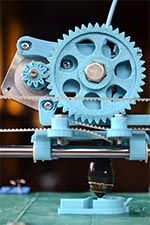
Manufacturing Original Didactic Experiences in Learning 3D (MODEL 3D)
www.waketech.edu/programs-courses/model-3d
The Manufacturing Original Didactic Experiences in Learning 3D (MODEL 3D) program at Wake Technical Community College (Wake Tech) is training students and educators using cutting edge 3D rapid prototyping technologies and enhancing the robust industries related to 3D printing and Additive Manufacturing (AM) across North Carolina. The primary goals of this project are to: 1) Strengthen Wake Tech curriculum by integrating current AM practices in ways that meet diverse learners' needs; 2) Improve student learning, performance, and industry skill acquisition by incorporating work-based and experiential learning opportunities in STEM courses; and 3) Collaborate with industry partners for curriculum development and education partners for dissemination activities. Key activities include establishment of MODEL 3D AM technology laboratories, creation of an industry partnership group, integration of AM technology into seven pilot courses, and professional development for Wake Tech faculty, external community college faculty, and secondary school educators. MODEL 3D makes innovative AM technology accessible to STEM students, community college faculty, and secondary educators by using portable 3D printing machinery, promoting student scholarship, and training educators. The project’s design affords participants multiple opportunities to interact with and learn about design software and printing equipment and to interface with 3D models, thereby enhancing learning in STEM courses.




